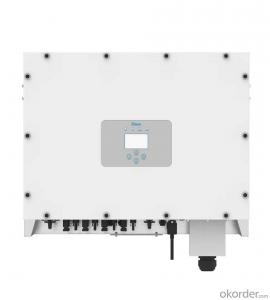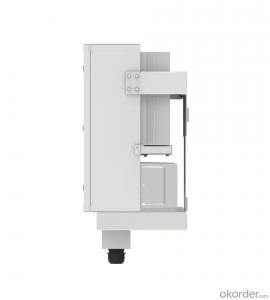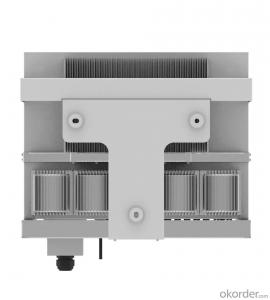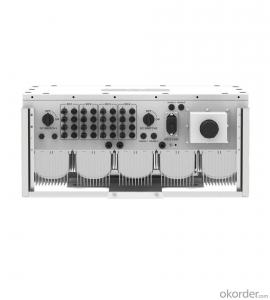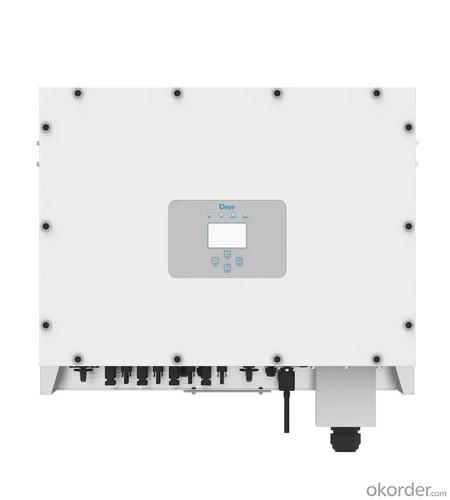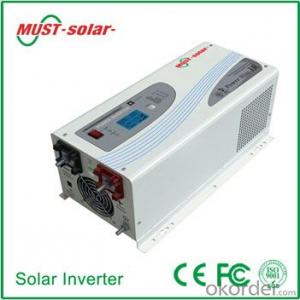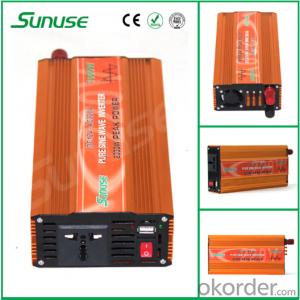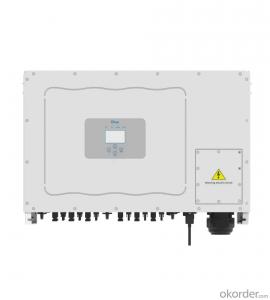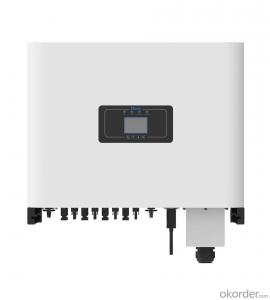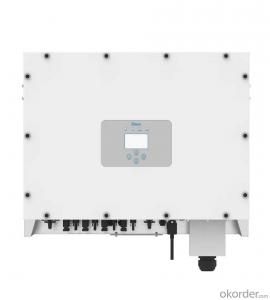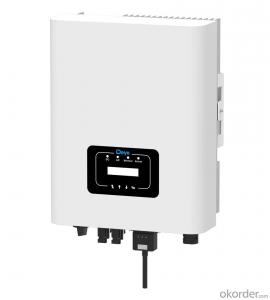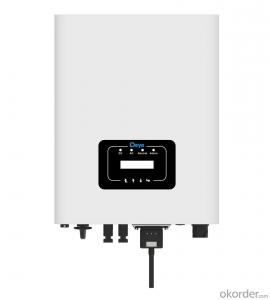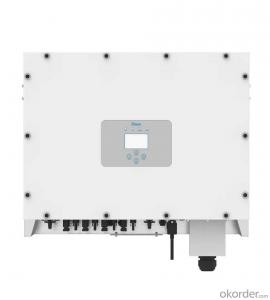SPS Solar Inverter - Sun-60/70/75/80k-G | 60-80kW | Three Phase | 4 MPPT
- Loading Port:
- Ningbo
- Payment Terms:
- TT OR LC
- Min Order Qty:
- 100 pc
- Supply Capability:
- 5000 pc/month
OKorder Service Pledge
OKorder Financial Service
You Might Also Like
Specification
| Model | SUN-60K-G | SUN-70K-G | SUN-75K-G | SUN-80K-G | ||
| Input Side | ||||||
| Max. DC Input Power (kW) | 78 | 91 | 97.5 | 104 | ||
| Max. DC Input Voltage (V) | 1000 | |||||
| Start-up DC Input Voltage (V) | 250 | |||||
| MPPT Operating Range (V) | 200~850 | |||||
| Max. DC Input Current (A) | 40+40+40+40 | |||||
| Max. Short Circuit Current (A) | 60+60+60+60 | |||||
| Number of MPPT / Strings per MPPT | 4/3 | 4/4 | 4/4 | 4/4 | ||
| Output Side | ||||||
| Rated Output Power (kW) | 60 | 70 | 75 | 80 | ||
| Max. Active Power (kW) | 66 | 77 | 82.5 | 88 | ||
| Nominal Output Voltage / Range (V) | 3L/N/PE 380V/0.85Un-1.1Un, 400V/0.85Un-1.1Un | |||||
| Rated Grid Frequency (Hz) | 50 / 60 (Optional) | |||||
| Operating Phase | Three phase | |||||
| Rated AC Grid Output Current (A) | 87 | 101.5 | 108.7 | 115.9 | ||
| Max. AC Output Current (A) | 95.7 | 111.6 | 119.6 | 127.5 | ||
| Output Power Factor | ||||||
| Grid Current THD | <3%< td=""> | |||||
| DC Injection Current (mA) | <0.5%< td=""> | |||||
| Grid Frequency Range | 47~52 or 57~62 (Optional) | |||||
| Efficiency | ||||||
| Max. Efficiency | 98.7% | |||||
| Euro Efficiency | 98.3% | |||||
| MPPT Efficiency | >99% | |||||
| Protection | ||||||
| DC Reverse-Polarity Protection | Yes | |||||
| AC Short Circuit Protection | Yes | |||||
| AC Output Overcurrent Protection | Yes | |||||
| Output Overvoltage Protection | Yes | |||||
| Insulation Resistance Protection | Yes | |||||
| Ground Fault Monitoring | Yes | |||||
| Anti-islanding Protection | Yes | |||||
| Temperature Protection | Yes | |||||
| Integrated DC Switch | Yes | |||||
| Remote software upload | Yes | |||||
| Remote change of operating parameters | Yes | |||||
| Surge protection | DC Type II / AC Type II | |||||
| General Data | ||||||
| Size (mm) | 700W×575H×297D | |||||
| Weight (kg) | 60 | |||||
| Topology | Transformerless | |||||
| Internal Consumption | <1W (Night) | |||||
| Running Temperature | -25~65℃, >45℃ derating | |||||
| Ingress Protection | IP65 | |||||
| Noise Emission (Typical) | <55 dB | |||||
| Cooling Concept | Smart cooling | |||||
| Max. Operating Altitude Without Derating | 2000m | |||||
| Warranty | 5 years | |||||
| Grid Connection Standard | CEI 0-21, VDE-AR-N 4105, NRS 097, IEC 62116, IEC 61727, G99, G98, VDE 0126-1-1, RD 1699, C10-11 | |||||
| Operating Surroundings Humidity | 0-100% | |||||
| Safety EMC / Standard | IEC/EN 61000-6-1/2/3/4, IEC/EN 62109-1, IEC/EN 62109-2 | |||||
| Features | ||||||
| DC Connection | MC-4 mateable | |||||
| AC Connection | IP65 rated plug | |||||
| Display | LCD 240 × 160 | |||||
| Interface | RS485/RS232/Wifi/LAN | |||||
The Deye 60-80K grid-connected inverter is suited for medium and large-scale commercial rooftops and ground-mounted solar PV system in which reliability and stability are important. the full series inverter has 30% DC input oversizing ratio and 10% AC output overloading ratio, offering a faster return on investment.
4 MPP tracker, Max. efficiency up to 98.7%
Zero export application, VSG application
String intelligent monitoring (optional)
Wide output voltage range
Type II DC/AC SPD
Anti-PID function (Optional)
- Q: Can a solar inverter be connected to the grid?
- Yes, a solar inverter can be connected to the grid. In fact, this is one of the main purposes of a solar inverter – to convert the direct current (DC) electricity generated by solar panels into alternating current (AC) electricity that can be used in homes and businesses or fed back into the grid. Connecting a solar inverter to the grid allows for the utilization of solar energy while also providing the opportunity to sell excess power back to the grid, contributing to renewable energy generation and potentially offsetting electricity costs.
- Q: Can a solar inverter be installed in a multi-storey building?
- Installing a solar inverter in a multi-storey building is indeed possible. The process of installation in such a building is similar to that in any other structure. Usually, the solar panels are placed on the rooftop or another open area that allows for maximum sunlight exposure. The solar inverter then converts the DC power generated by the panels into AC power. In a multi-storey building, the solar inverter can be positioned either on the rooftop or in a dedicated room or space on one of the floors. Factors like accessibility, ventilation, and proximity to the solar panels should be considered when deciding where to install it. Compliance with local building codes and regulations is crucial to ensure the inverter is placed in a safe and secure location. Furthermore, proper installation of the wiring and cabling necessary for connecting the solar panels to the inverter is essential. The vertical distance between the panels and the inverter should be taken into account. Additionally, precautions must be taken to prevent any harm or electrical risks during the installation process. By carefully planning and using appropriate installation techniques, a solar inverter can be readily installed in a multi-storey building. This installation will enable the utilization of solar energy and reduce electricity costs for the building's residents or occupants.
- Q: The function of photovoltaic grid - connected inverter
- In general, single-phase h-bridge is a common configuration of dc / ac-level, but can also be used in three-phase and other configurations.
- Q: How does a solar inverter affect the overall aesthetics of a solar installation?
- A solar inverter does not have a direct impact on the overall aesthetics of a solar installation as it is typically installed indoors or in a separate enclosure. The inverter's primary function is to convert the DC electricity generated by the solar panels into usable AC electricity for consumption. However, it is important to choose an inverter that is compatible with the installation's design and size to ensure efficient operation and minimal visual impact.
- Q: How does a solar inverter handle variations in solar irradiation?
- A solar inverter handles variations in solar irradiation by continuously monitoring the incoming solar energy and adjusting its output accordingly. It uses maximum power point tracking (MPPT) technology to ensure that it extracts the maximum power available from the solar panels under different irradiation levels. This allows the inverter to regulate the voltage and current output to match the varying solar conditions, ensuring optimal efficiency and power conversion.
- Q: Grid-connected inverter is generally divided into photovoltaic power generation grid-connected inverter, wind power grid-connected inverter, power equipment and grid-connected inverter and other power generation equipment power generation inverter.
- The grid inverter is a current source, the output voltage is basically the grid voltage, may be slightly raised.
- Q: How does a microinverter differ from a string inverter?
- A microinverter differs from a string inverter in that it is a small, individual inverter that is connected to each solar panel in a system, whereas a string inverter is a larger inverter that is connected to multiple panels in a series (string). This means that each panel with a microinverter can operate independently, optimizing the power output of each panel, while a string inverter operates based on the performance of the entire string of panels. Microinverters also allow for easier monitoring and maintenance as the performance of each panel can be individually tracked, whereas with a string inverter, any issues affecting one panel can impact the output of the entire string.
- Q: What is the maximum input voltage for a solar inverter?
- The maximum input voltage for a solar inverter depends on the specific model and manufacturer. It can vary, but generally, solar inverters can handle input voltages ranging from 300 to 1000 volts.
- Q: Can a solar inverter be connected to a generator?
- Yes, a solar inverter can be connected to a generator. This allows the solar energy system to work in conjunction with the generator, providing additional power when the solar energy is insufficient or unavailable. The generator serves as a backup power source, ensuring a continuous supply of electricity.
- Q: Can a solar inverter be used with solar concentrators?
- Yes, a solar inverter can be used with solar concentrators. Solar concentrators focus sunlight onto a smaller area, increasing the intensity of the light. The solar inverter's primary function is to convert the DC power generated by the solar panels into AC power suitable for use in homes or businesses. Therefore, it can still be used to convert the enhanced DC power generated by solar concentrators into usable AC power.
Send your message to us
SPS Solar Inverter - Sun-60/70/75/80k-G | 60-80kW | Three Phase | 4 MPPT
- Loading Port:
- Ningbo
- Payment Terms:
- TT OR LC
- Min Order Qty:
- 100 pc
- Supply Capability:
- 5000 pc/month
OKorder Service Pledge
OKorder Financial Service
Similar products
Hot products
Hot Searches
Related keywords
